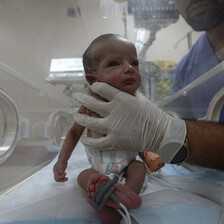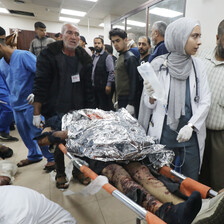The Electronic Intifada 19 May 2024

Rana with baby Aous and one of her other children. (Photo courtesy of family)
In my work as an obstetrician, I encounter snippets of the struggles by pregnant women.
Each one has her own ordeal during each stage of her pregnancy. We see and hear a part of each story.
Outside of the work environment, I can see and hear a more complete story. I have two sisters, who have both been pregnant during Israel’s current war on Gaza.
Let me tell you the story of my sister Rana.
As she entered the more advanced stages of her pregnancy, Rana required specialized care. Already the mother of two children, she had a history of obstetric complications.
Rana had two previous cesarean section deliveries.
On the first occasion, the baby was fine with special care. On the second occasion, the baby was diagnosed with pulmonary stenosis and urgently referred to a Jerusalem hospital for surgery.
During the current war, Rana was extremely worried.
“What if my baby faces the same issue again and it’s hard to get him referred?” she asked. “I’m afraid that I might lose him.”
In the first week of the war, a building beside Rana’s home was attacked.
Rana had to hurriedly leave her fifth floor apartment.
Following that horrible incident, we took shelter with Rana’s in-laws.
Strength
That area soon came under bombardment. Israel fired about 40 missiles on the area within a three hour period.
Rana held her children close. Despite her fear, she could feel her baby kicking nonstop in her womb.
That gave her strength. She was reassured that the baby was healthy.
After searching tirelessly, I finally found medicine that Rana needed. I felt a sense of relief that I could do so.
However, during lunch one day, the airstrikes and shelling intensified around us.
Our neighbor urged us to evacuate the tower quickly after receiving a threatening call.
We had bags backed with essential items. But we had to flee without them as the airstrikes were so intense.
That meant Rana had to leave behind her medicine, supplements and clothes.
We moved to my fiancé’s home. Each stage of our journey became increasingly difficult.
We had to pause often and take deep breaths.
The situation became unbearable.
Clean water, gas, vegetables, milk and flour were scarce. Finding some – even in small quantities – was a major challenge.
Rana told me that she was going through a mental breakdown. She cried heavily.
“Death corridor”
We decided to head for southern Gaza. We did so despite the terror we had heard about from people who had crossed what Israel had deceptively called a “safe corridor.”
Rana described it far more accurately as a “death corridor.”
For two hours, we were forced to walk, carrying our personal belongings and the children with us. It was a walk of humiliation and fear.
The long walk would be difficult for anyone.
For Rana – who was eight months pregnant and had been uprooted repeatedly – it was a nightmare.
We made it to Rafah, Gaza’s southernmost city.
As the ninth month of pregnancy began, Rana started having some pains. I accompanied her to the only functioning maternity hospital in Rafah.
Rana’s baby was delivered via a cesarean. He is called Aous.
His birth gave Rana her first moment of joy amid this terrible war.
“He arrived safe and sound,” she said. “Alhamdulillah.”
Rana and her newborn baby faced numerous difficulties.
There was no comfortable bed in which Rana could rest after the cesarean. She struggled to find milk and the right size of diapers for Aous.
And there was a shortage of clothing for babies.
They did the best that they could. And it was finally possible for them to leave Gaza and enter Egypt.
Knowing that Rana and her children are safe has been comforting.
Not long after they left Gaza, the Rafah house in which we had taken shelter was hit in an airstrike.
A missile struck the room in which Rana and her children had slept. Thank God they were no longer there.
Dr. Roba Almadhoun is an obstetrician in Gaza.





